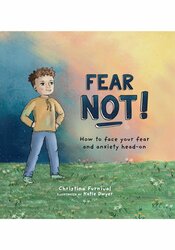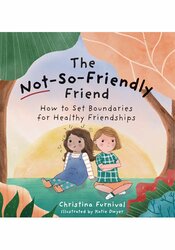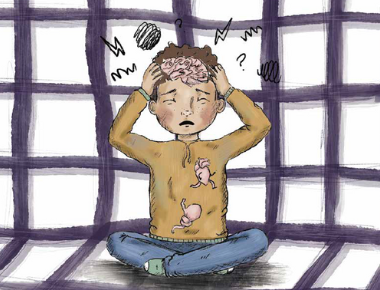Ask a Therapist: My Child Is Showing Signs of Anxiety
Discover a 2-step plan to empower anxious kids

I have noticed over the past few months that my seven-year-old is more irritable and angry than usual, is waking up at night with nightmares (which is not normal for her), and is resistant to do things that never bothered her before. When I try to ask her whatÔÇÖs going on, she just says she doesnÔÇÖt know. How can I help?
ÔÇô Concerned but Unsure
Dear Concerned,
Well done on knowing your child so well and noticing these shifts. Awareness is the best starting point, and you are already doing it. It is also great that you are checking in with your daughter, showing her that you see her and that you care. The next step is offering her confidence that you can help her manage this.
But what is this? Based on just the few symptoms you listed, I would venture to guess your little one is dealing with anxious thoughts and feelings. Sometimes the root of anxiety is an identifiable stressor, but sometimes it is nebulous and without a pinpointable cause. With that in mind, it could be why your daughter isnÔÇÖt sure what is happening for her or isnÔÇÖt able to describe it.
The past couple years have shaken up all of our worlds, including those of our children. The messaging we parents often receive is that children are resilient, and while they certainly are, it does not mean they are not strongly impacted. Two years into the pandemic, your seven-year-old has had a pretty constant flux, with an incredible amount of changes, for over a quarter of her life!
What you will want to do for your daughter is to help her to feel like she isnÔÇÖt alone in feeling anxiety, and to show her that she can handle it. The goal is actually not to tell her that she can make her anxiety go awayÔÇöanxiety has a sneaky way of popping up time and time again, and what we want is for her to know she can cope, not that she has failed for not squashing its existence. (A lot of kids feel this way if they think thatÔÇÖs the goal.)
So how can you offer her confidence about managing these new feelings sheÔÇÖs experiencing? Help her to realize and understand the following:
Help your daughter by putting a name to her experiences, and make sure to share with her some worries that you had as a child. Express that you know what it is like to feel anxious.
It may sound something like, ÔÇ£What youÔÇÖre feeling reminds me of how I felt sometimes when I was around your age. And what I learned was that I was feeling anxious. Have you heard of anxiety before? What do you know about it?ÔÇØ
From there, you can help her to understand that we can take on our fears, worries, and anxiety by challenging ourselves to not hide from them. When we hide from our fears and anxiety, it is actually counterproductive, making them grow even bigger. But when we acknowledge our anxiety as we push ourselves to face our fears, we learn we can handle and tolerate them, which then makes them smaller (and makes us feel more powerful against them).
This may sound something like, ÔÇ£You feel really nervous and anxious. ThatÔÇÖs uncomfortable, but I know that you can handle it. You can be brave at the same time as feeling this way, and when you push yourself, you will show yourself that your fear/worry/anxiety is not as scary or as big as it seems right now.ÔÇØ
There are also many books (for children and adults!) that can help support your conversation with her, including my newest book . Keep up the great work of supporting your girl.
ÔÇô Christina Furnival, MS, LPCC
ÔÇô Concerned but Unsure
Well done on knowing your child so well and noticing these shifts. Awareness is the best starting point, and you are already doing it. It is also great that you are checking in with your daughter, showing her that you see her and that you care. The next step is offering her confidence that you can help her manage this.
But what is this? Based on just the few symptoms you listed, I would venture to guess your little one is dealing with anxious thoughts and feelings. Sometimes the root of anxiety is an identifiable stressor, but sometimes it is nebulous and without a pinpointable cause. With that in mind, it could be why your daughter isnÔÇÖt sure what is happening for her or isnÔÇÖt able to describe it.
The past couple years have shaken up all of our worlds, including those of our children. The messaging we parents often receive is that children are resilient, and while they certainly are, it does not mean they are not strongly impacted. Two years into the pandemic, your seven-year-old has had a pretty constant flux, with an incredible amount of changes, for over a quarter of her life!
What you will want to do for your daughter is to help her to feel like she isnÔÇÖt alone in feeling anxiety, and to show her that she can handle it. The goal is actually not to tell her that she can make her anxiety go awayÔÇöanxiety has a sneaky way of popping up time and time again, and what we want is for her to know she can cope, not that she has failed for not squashing its existence. (A lot of kids feel this way if they think thatÔÇÖs the goal.)
So how can you offer her confidence about managing these new feelings sheÔÇÖs experiencing? Help her to realize and understand the following:
1. She isnÔÇÖt alone in feeling anxious
Help your daughter by putting a name to her experiences, and make sure to share with her some worries that you had as a child. Express that you know what it is like to feel anxious.
It may sound something like, ÔÇ£What youÔÇÖre feeling reminds me of how I felt sometimes when I was around your age. And what I learned was that I was feeling anxious. Have you heard of anxiety before? What do you know about it?ÔÇØ
2. She can handle her anxiety
From there, you can help her to understand that we can take on our fears, worries, and anxiety by challenging ourselves to not hide from them. When we hide from our fears and anxiety, it is actually counterproductive, making them grow even bigger. But when we acknowledge our anxiety as we push ourselves to face our fears, we learn we can handle and tolerate them, which then makes them smaller (and makes us feel more powerful against them).
This may sound something like, ÔÇ£You feel really nervous and anxious. ThatÔÇÖs uncomfortable, but I know that you can handle it. You can be brave at the same time as feeling this way, and when you push yourself, you will show yourself that your fear/worry/anxiety is not as scary or as big as it seems right now.ÔÇØ
There are also many books (for children and adults!) that can help support your conversation with her, including my newest book . Keep up the great work of supporting your girl.
ÔÇô Christina Furnival, MS, LPCC
Discover the Capable Kiddos Book Series

How can I help my child overcome their fear and anxiety? What skills can I teach my child to cope with scary ÔÇ£what ifÔÇØ thoughts? How can I help them grow more confident when their worries seem so big?
Christina Furnival, a licensed mental health therapist and mom, answers these questions in this empowering and uplifting rhyming story about a young boy who successfully faces his anxiety and fear head-on. In Fear Not!, children will learn a practical three-step lesson to manage their worries, regain their cool, and strip fear of its power once and for all.
By teaching children how to confront their fears and mindfully ride the wave of anxiety, this book equips them with the tools they need to deal with the inevitable stressors of life and feel confident no matter the challenge.
Christina Furnival, a licensed mental health therapist and mom, answers these questions in this empowering and uplifting rhyming story about a young boy who successfully faces his anxiety and fear head-on. In Fear Not!, children will learn a practical three-step lesson to manage their worries, regain their cool, and strip fear of its power once and for all.
By teaching children how to confront their fears and mindfully ride the wave of anxiety, this book equips them with the tools they need to deal with the inevitable stressors of life and feel confident no matter the challenge.

How can I help my child deal with a bully? What do I teach them about handling an on-again-off-again, not-so-friendly friend? My advice to ÔÇ£just be kindÔÇØ isnÔÇÖt helping, and my child is still hurting.
Christina Furnival, a licensed mental health therapist and mom, helps answer these questions in this charming and engaging rhyming story about a young child who successfully navigates the complexities of an unkind peer relationship.
In The Not-So-Friendly Friend, children will learn an easy and practical lesson about how to firmly and assertively ÔÇô yet kindly ÔÇô stand up for themselves in the face of a bully. By teaching children about the importance and value of setting boundaries for healthy friendships, this book provides children the tools they need to foster their social confidence and emotional well-being.
Christina Furnival, a licensed mental health therapist and mom, helps answer these questions in this charming and engaging rhyming story about a young child who successfully navigates the complexities of an unkind peer relationship.
In The Not-So-Friendly Friend, children will learn an easy and practical lesson about how to firmly and assertively ÔÇô yet kindly ÔÇô stand up for themselves in the face of a bully. By teaching children about the importance and value of setting boundaries for healthy friendships, this book provides children the tools they need to foster their social confidence and emotional well-being.
Meet the Expert:
Christina Furnival, MS, LPCC, is a wife, mother of two, writer, author, and licensed mental health therapist. With over a decade of experience in the field, she is passionate about helping parents and children grow their skill sets, overcome challenges, and gain confidence to live happy, fulfilling lives.
Her meaningful stories in the Capable Kiddos series serve as entertaining and enlightening resources to empower children and to make them feel capable of managing tough situations and their accompanying emotions.
Learn more about their educational products, including upcoming live seminars, by clicking here.
Her meaningful stories in the Capable Kiddos series serve as entertaining and enlightening resources to empower children and to make them feel capable of managing tough situations and their accompanying emotions.
Learn more about their educational products, including upcoming live seminars, by clicking here.
Topic: Anxiety/Depression | Children & Adolescents
Tags: Advice | Kids | Strategies | Success | Wisdom



